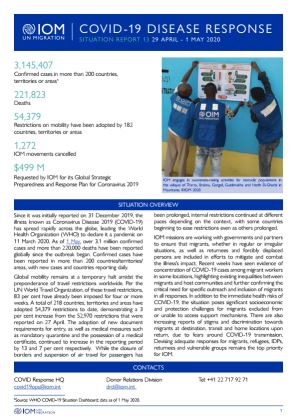-
Countries
-
Data and Analysis
-
Special Focus
-
Crisis Responses
COVID-19 Response - Situation Report 13 ( 29 April - 1 May 2020)

Contact
COVID Response HQ covid19ops@iom.int
Language
English
Location
Global
Period Covered
Apr 29 2020
May 01 2020
Activity
- Other
Since it was initially reported on 31 December 2019, the illness known as Coronavirus Disease 2019 (COVID-19) has spread rapidly across the globe, leading the World Health Organization (WHO) to declare it a pandemic on 11 March 2020. As of 1 May, over 3.1 million confirmed cases and more than 220,000 deaths have been reported globally since the outbreak began. Confirmed cases have been reported in more than 200 countries/territories/ areas, with new cases and countries reporting daily. Global mobility remains at a temporary halt amidst the preponderance of travel restrictions worldwide. Per the UN World Travel Organization, of these travel restrictions, 83 per cent have already been imposed for four or more weeks. A total of 218 countries, territories and areas have adopted 54,379 restrictions to date, demonstrating a 3 per cent increase from the 52,970 restrictions that were reported on 27 April. The adoption of new document requirements for entry, as well as medical measures such as mandatory quarantine and the possession of a medical certificate, continued to increase in the reporting period by 13 and 7 per cent respectively. While the closure of borders and suspension of air travel for passengers has been prolonged, internal restrictions continued at different paces depending on the context, with some countries beginning to ease restrictions even as others prolonged. IOM missions are working with governments and partners to ensure that migrants, whether in regular or irregular situations, as well as returnees and forcibly displaced persons are included in efforts to mitigate and combat the illness’s impact. Recent weeks have seen evidence of concentration of COVID-19 cases among migrant workers in some locations, highlighting existing inequalities between migrants and host communities and further confirming the critical need for specific outreach and inclusion of migrants in all responses. In addition to the immediate health risks of COVID-19, the situation poses significant socioeconomic and protection challenges for migrants excluded from or unable to access support mechanisms. There are also increasing reports of stigma and discrimination towards migrants at destination, transit and home locations upon return, due to fears around COVID-19 transmission. Devising adequate responses for migrants, refugees, IDPs, returnees and vulnerable groups remains the top priority for IOM.
